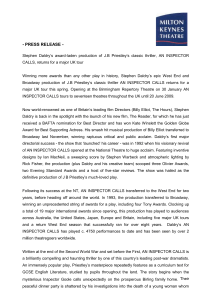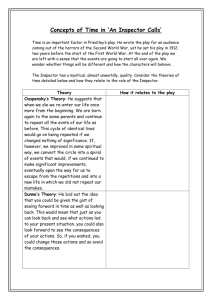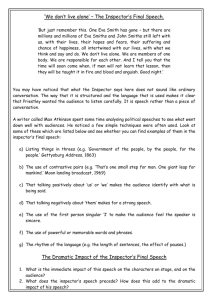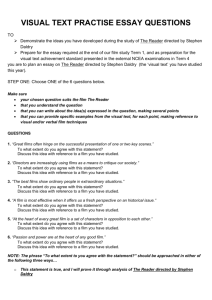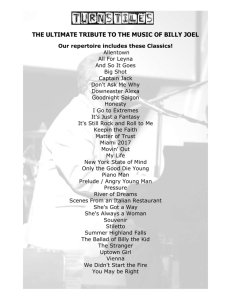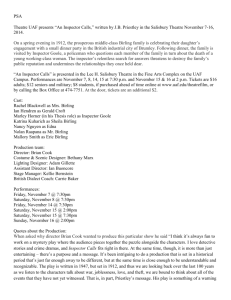an inspector calls
advertisement
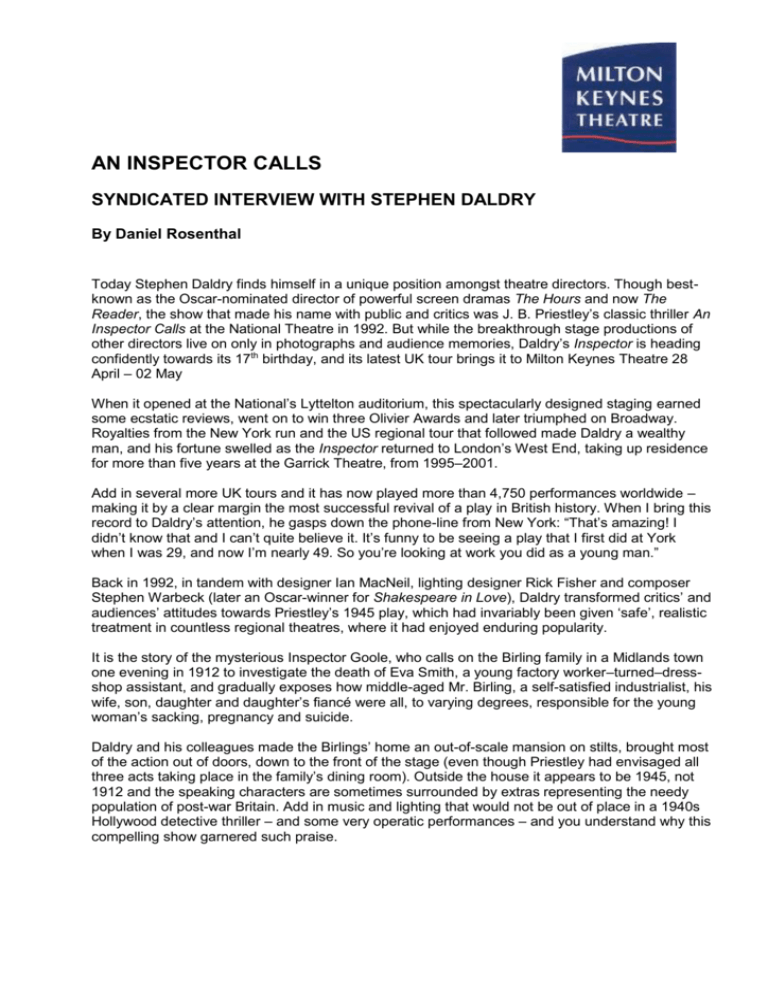
AN INSPECTOR CALLS SYNDICATED INTERVIEW WITH STEPHEN DALDRY By Daniel Rosenthal Today Stephen Daldry finds himself in a unique position amongst theatre directors. Though bestknown as the Oscar-nominated director of powerful screen dramas The Hours and now The Reader, the show that made his name with public and critics was J. B. Priestley’s classic thriller An Inspector Calls at the National Theatre in 1992. But while the breakthrough stage productions of other directors live on only in photographs and audience memories, Daldry’s Inspector is heading confidently towards its 17th birthday, and its latest UK tour brings it to Milton Keynes Theatre 28 April – 02 May When it opened at the National’s Lyttelton auditorium, this spectacularly designed staging earned some ecstatic reviews, went on to win three Olivier Awards and later triumphed on Broadway. Royalties from the New York run and the US regional tour that followed made Daldry a wealthy man, and his fortune swelled as the Inspector returned to London’s West End, taking up residence for more than five years at the Garrick Theatre, from 1995–2001. Add in several more UK tours and it has now played more than 4,750 performances worldwide – making it by a clear margin the most successful revival of a play in British history. When I bring this record to Daldry’s attention, he gasps down the phone-line from New York: “That’s amazing! I didn’t know that and I can’t quite believe it. It’s funny to be seeing a play that I first did at York when I was 29, and now I’m nearly 49. So you’re looking at work you did as a young man.” Back in 1992, in tandem with designer Ian MacNeil, lighting designer Rick Fisher and composer Stephen Warbeck (later an Oscar-winner for Shakespeare in Love), Daldry transformed critics’ and audiences’ attitudes towards Priestley’s 1945 play, which had invariably been given ‘safe’, realistic treatment in countless regional theatres, where it had enjoyed enduring popularity. It is the story of the mysterious Inspector Goole, who calls on the Birling family in a Midlands town one evening in 1912 to investigate the death of Eva Smith, a young factory worker–turned–dressshop assistant, and gradually exposes how middle-aged Mr. Birling, a self-satisfied industrialist, his wife, son, daughter and daughter’s fiancé were all, to varying degrees, responsible for the young woman’s sacking, pregnancy and suicide. Daldry and his colleagues made the Birlings’ home an out-of-scale mansion on stilts, brought most of the action out of doors, down to the front of the stage (even though Priestley had envisaged all three acts taking place in the family’s dining room). Outside the house it appears to be 1945, not 1912 and the speaking characters are sometimes surrounded by extras representing the needy population of post-war Britain. Add in music and lighting that would not be out of place in a 1940s Hollywood detective thriller – and some very operatic performances – and you understand why this compelling show garnered such praise. The Inspector’s touring cast have been rehearsed by Julian Webber, Daldry’s longtime, trusted Associate Director; Daldry himself has spent most of the last few months in New York, where last autumn he was simultaneously completing The Reader, for its release in American cinemas on December 10, and preparing for the Broadway opening on November 13 of Billy Elliot the Musical, the stage version of Lee Hall’s screenplay about the miner’s son who discovers ballet, which as Billy Elliot (2000) was Daldry’s award-winning debut as a feature film director. These tight deadlines obliged him to perform a “wonderful juggling act during one of the most extraordinary periods of my life.” His days started early. “I was getting up between five and six each morning and worked in the Reader edit room, which I had moved very close to the Imperial Theatre, where Billy was rehearsing, usually from 6.30am ’til lunchtime.” While Daldry toiled on the very complex triple process of picture, sound and dialogue editing, the children in the Billy cast were attending lessons at the special private schoolroom set up by the producers. “Then I’d rehearse in the theatre in the afternoon, nip back to the edit room while the cast and crew were on their tea break, then back to the theatre for evening rehearsals and into the preview performances. You’ve got around 200 people in the theatre, and just up the road about 80 working on finishing the film. It was rather wonderful having two very different families, if you like, all working incredibly hard. We all did get together sometimes, and the film crew came to watch Billy. The only real casualty of the whole period was not being able to take my kids to school.” (He and his wife have daughters aged five and four). The Reader, based on the international bestseller by Bernard Schlink about a tram ticket inspector in 1950s Germany who has an affair with a teenage boy – and harbours two devastating secrets, has brought Bafta and Oscar nominations for Daldry and screenwriter David Hare. The Reader Star Kate Winslet, recently won Best Actress jn the 2009 Oscars and a Golden Globe for this role and her success has delighted Daldry as much as Nicole Kidman’s Best Actress Oscar for playing novelist Virginia Woolf in his previous film, The Hours (2002; also adapted by Hare from a successful novel). “I think that for a director the most thrilling aspect of anything to do with awards is when the actors win,” he says. The creative team on The Reader, he adds, went through “such a long and difficult journey”, including having to cope with the premature deaths last spring of two of their producers, Sydney Pollack and Anthony Minghella, “that as a director your joy is in the actors’ recognition. Seriously, that’s the best you can ever hope for – the opportunity to celebrate your actors and jump up and down about them.” Billy, which features music by Elton John, is playing to packed houses in New York and is likely to feature strongly when Broadway’s Oscars, the Tony Awards, announce their nominations in May. [NOTE: THIS PARA TO BE UPDATED after May 5 TONY NOMINATIONS. See: www.tonyawards.com/en_US/about/press/index.html]. As it heads for its fourth birthday in the West End and pulls in the crowds Down Under, where it ran in Sydney for a year and recently opened in Melbourne, the question now is whether Billy might become Daldry’s next film project. After Mamma Mia! took a staggering $570m around the world and became the best-selling DVD in British history, its makers, Universal Pictures, who also co-produced Billy on stage and screen, are keen to see Daldry and Hall team up again to turn the show into a movie musical. “Universal are looking at those Mamma Mia! DVD sales and going ‘Wow!’” laughs Daldry. “But Lee Hall and I just giggle at the sidelines at the moment. The musical has been at the centre of our lives for five years. It takes a huge amount of work and resources, and because of the kids in the cast it’s unlike any other show.” The care and commitment that is required to educate, train, rehearse and generally look after young casts in three cities is an extraordinary year-round operation. So, Daldry says, “the idea that I’d then spend two more years putting it back onto celluloid… I just find that funny at the moment.” On Broadway, Billy Elliot’s tale of an underdog triumphing against a background of economic turmoil (the 1984 miners’ strike) appears perfectly timed to give American theatregoers uplifting respite from financial gloom. And on this side of the Atlantic, too, Daldry reckons that An Inspector Calls, though a less obviously ‘feel-good’ evening, might chime with Credit Crunch Britain. “There is this profound recession hitting, and a piece of work in which a group of actors, in Billy, or in the Inspector’s case one actor [as Goole], comes out and calls for [people to have] a sense of community and common purpose, and against the idea of selfishness and greed, is something that I think audiences on Broadway and here understand hugely.” In his final speech, the Inspector addresses the audience and declares that the Birlings’ involvement in Eva Smith’s fate demonstrates that: “We are responsible for each other. And I tell you that the time will soon come when if men will not learn that lesson then they will be taught it in fire in blood in anguish.” And Daldry concludes: “As we move into this extraordinary time, as the economy tanks and communities become more under threat, that call to arms of Priestley’s is one which will be relevant. I’m dying to see how the Inspector resonates in this economic climate.” • An Inspector Calls is at Milton Keynes Theatre 28 April – 02 May call Box Office on 0870 060 6652 -Ends-
